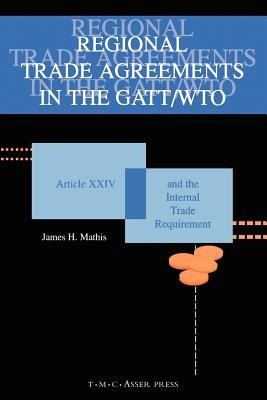
- We will send in 10–14 business days.
- Author: James Mathis
- Publisher: T.M.C. Asser Press
- Year: 2002
- Pages: 328
- ISBN-10: 9067041394
- ISBN-13: 9789067041393
- Format: 15.8 x 23.7 x 1.8 cm, minkšti viršeliai
- Language: English
- SAVE -10% with code: EXTRA
Regional Trade Agreements in the Gatt/Wto: Artical XXIV and the Internal Trade Requirement (e-book) (used book) | bookbook.eu
Reviews
Description
The economic theory of Preferential Trade Agreements (PTAs), or discriminatory trade liberalization for and among a subset ofnations, was first analyzed with fun- damental and startling insight by Jacob Viner (1950). He destroyed the intuition that any move towards free trade was welfare-enhancing, for the country itself or for the world, or for both. He introduced us memorably to the notion of trade di- verting -- and here, he meant not diversion in the old and approving sense of en- tertainment but in the modern and castigating sense ofdistorting - Free Trade Ar- eas (FTAs) and Customs Unions (CUs). In other words, in the economists'jargon, discriminatory approaches to freeing trade were not monotonically welfare-im- proving. The legal scholars of GATT and trade law, chiefly the giants Robert Hudec, John Jackson and Kenneth Dam in the United States, were quick to follow suit. Their classic writings on Article XXIV ofthe GATT, which provides an exception to the MFN obligation for contracting parties provided they go all the way and cre- ate FTAs and CUs which are supposed to reduce internal trade barriers fully rath- er than settle for a lesser preferential arrangement, are still a pleasure to read. They are in the best tradition of a creative interaction between the economic and the le- gal disciplines. Indeed, today, as my own work with Robert Hudec, resulting in a major two-volume publication by MIT Press underlines, that interaction has be- come yet more profound.
EXTRA 10 % discount with code: EXTRA
The promotion ends in 23d.12:08:55
The discount code is valid when purchasing from 10 €. Discounts do not stack.
- Author: James Mathis
- Publisher: T.M.C. Asser Press
- Year: 2002
- Pages: 328
- ISBN-10: 9067041394
- ISBN-13: 9789067041393
- Format: 15.8 x 23.7 x 1.8 cm, minkšti viršeliai
- Language: English English
The economic theory of Preferential Trade Agreements (PTAs), or discriminatory trade liberalization for and among a subset ofnations, was first analyzed with fun- damental and startling insight by Jacob Viner (1950). He destroyed the intuition that any move towards free trade was welfare-enhancing, for the country itself or for the world, or for both. He introduced us memorably to the notion of trade di- verting -- and here, he meant not diversion in the old and approving sense of en- tertainment but in the modern and castigating sense ofdistorting - Free Trade Ar- eas (FTAs) and Customs Unions (CUs). In other words, in the economists'jargon, discriminatory approaches to freeing trade were not monotonically welfare-im- proving. The legal scholars of GATT and trade law, chiefly the giants Robert Hudec, John Jackson and Kenneth Dam in the United States, were quick to follow suit. Their classic writings on Article XXIV ofthe GATT, which provides an exception to the MFN obligation for contracting parties provided they go all the way and cre- ate FTAs and CUs which are supposed to reduce internal trade barriers fully rath- er than settle for a lesser preferential arrangement, are still a pleasure to read. They are in the best tradition of a creative interaction between the economic and the le- gal disciplines. Indeed, today, as my own work with Robert Hudec, resulting in a major two-volume publication by MIT Press underlines, that interaction has be- come yet more profound.


Reviews